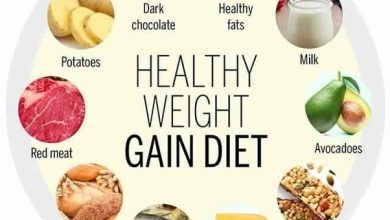Why You Should Eating Well a Little Every Day

Introduction
Are you tired of feeling sluggish and drained throughout the day? Do you want to improve your overall health and well-being? Look no further than your plate! Incorporating healthy, delicious foods into your daily routine can have a profound impact on both your physical and mental health.
In this blog post, we’ll explore the benefits of eating well, the consequences of not doing so, and provide tips and recipes for incorporating nutritious meals into your everyday life. Get ready to feel energized, satisfied, and nourished from the inside out!

The Benefits of Eating Well
Eating well is vital for our overall health and wellbeing. Consuming a balanced diet filled with plenty of nutrients is essential to maintain a healthy body weight, reduce the risk of chronic diseases, and improve our mental health.
One key benefit of eating well is that it can help prevent various illnesses such as heart disease, stroke, and type 2 diabetes. A balanced diet rich in fruits, vegetables, whole grains, lean protein sources, and healthy fats can provide all the necessary vitamins and minerals that our bodies need to function correctly.
Furthermore, those who eat well are often more energized throughout the day since their bodies have adequate fuel to sustain them. This leads to better productivity at work or school while also reducing fatigue levels during physical activities.
Additionally, eating well has been linked to improved mental health outcomes such as lower rates of depression and anxiety. Proper nutrition supports brain function by providing essential nutrients necessary for optimal cognitive performance.
In conclusion,eating well should be a priority if we want to lead a happy and healthy life. By consuming nutrient-dense foods regularly while limiting processed foods high in sugar or unhealthy fats; we give ourselves the best chance at living long-term good health lives full of energy!

The Consequences of Not Eating Well
Not eating well can have serious consequences on your overall health and wellbeing. When you consistently consume foods that are high in sugar, saturated fats, and processed ingredients, it can lead to a number of negative impacts.
Firstly, a poor diet increases the risk of chronic diseases such as diabetes, heart disease, and cancer. This is because the body doesn’t receive the nutrients it needs to function properly.
Additionally, not eating well can affect your mental health. Studies have shown that there is a link between an unhealthy diet and depression or anxiety. A lack of certain vitamins and minerals can also impact brain function and cognition.
Furthermore, consuming too much junk food or fast food can lead to weight gain which puts strain on joints causing pain that lasts for years which could be avoided if someone eats right early enough. This effect extends beyond physical discomfort – feeling unhappy with one’s appearance often leads to low self-esteem.
Lastly but certainly not least – failing to eat well affects sleep quality adversely due mainly lack of some important nutrients like tryptophan which helps improve sleep duration.
In conclusion these are just a few examples among many reasons why eating well should be prioritized!
How to Eat Well Every Day
Eating well every day doesn’t have to be complicated or time-consuming. In fact, it can be quite simple! Here are some tips on how to eat well every day:
1. Plan ahead: Take a few minutes each week to plan your meals and snacks. This will help you avoid unhealthy choices when you’re in a rush.
2. Include a variety of foods: Eating a variety of foods ensures that your body gets all the nutrients it needs. Try to include different colors and textures in your meals.
3. Choose whole foods: Whole foods are those that are minimally processed and contain no added sugars or fats. These include fruits, vegetables, lean proteins, whole grains, and nuts/seeds.
4. Cook at home: Cooking at home allows you to control what goes into your meals and saves money compared to eating out frequently.
5. Listen to your hunger cues: Eat when you’re hungry and stop when you’re full. Pay attention to how certain foods make you feel so you can make informed choices about what works best for your body.
By following these simple tips, eating well every day can become second nature!

Recipes for Eating Well
Eating well doesn’t have to mean bland and boring food. With the right ingredients and recipes, you can enjoy delicious meals that are also good for your body.
One recipe idea is a quinoa salad with roasted vegetables and a lemon vinaigrette dressing. Cook the quinoa according to package instructions, then roast some of your favorite veggies like bell peppers, zucchini, and sweet potatoes.
For breakfast, try making overnight oats with almond milk, chia seeds, and fresh fruit. Mix all the ingredients in a jar or container before bed and let it sit in the fridge overnight for an easy grab-and-go meal in the morning.
If you’re looking for something heartier, consider making grilled chicken with a side of roasted asparagus and brown rice pilaf. Marinate the chicken in olive oil, garlic powder, salt and pepper before grilling to add extra flavor.
Don’t forget about snacks! Cut up some carrots and celery sticks to dip into hummus or make homemade energy balls using dates, nuts,and cocoa powder for a sweet treat without added sugars.
By experimenting with different recipes that incorporate whole foods such as fruits/vegetables & lean proteins,you ensure yourself eating healthy while still enjoying delicious food options every day!

Conclusion
Eating well every day is not just a matter of physical health, but it also impacts our mental and emotional wellbeing. The benefits of eating well go beyond maintaining a healthy weight or preventing chronic diseases; it can improve our mood, energy levels, and overall quality of life.
On the other hand, neglecting to eat well can have serious consequences for our health in the long run. It’s essential to prioritize nutrition in our daily lives and make conscious choices about what we put into our bodies.
By incorporating more fruits and vegetables, whole grains, lean proteins, and healthy fats into our meals each day, we can create lifelong habits that promote wellness. Remember that small changes over time can lead to significant results.
So next time you’re deciding what to eat for your next meal or snack, think about how you can make choices that support your body’s needs. Your future self will thank you!
What are the functions of the food?
Develop strong muscles, bones and teeth; Keep our bodies warm and give us energy; Keep our bodies healthy by helping our immune systems to prevent or fight disease; Repair or healing of injuries.
What are the components of food?
Food comprises of essential nutrients namely, carbohydrates, proteins, fats, vitamins and minerals.




These are in fact enormous ideas in regarding blogging.
You have touched some nice things here. Any way keep
up wrinting.